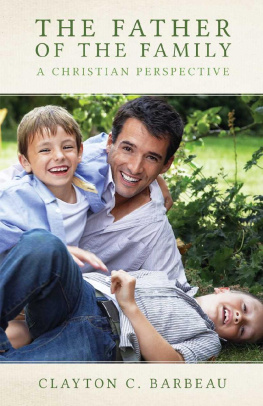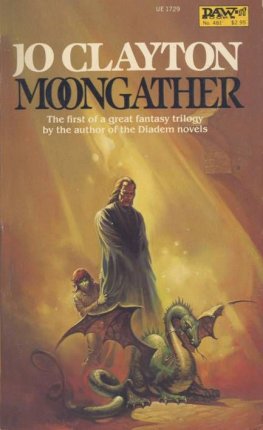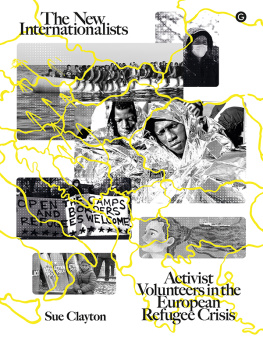Clayton Barbeau - The Father of the Family
Here you can read online Clayton Barbeau - The Father of the Family full text of the book (entire story) in english for free. Download pdf and epub, get meaning, cover and reviews about this ebook. year: 2013, publisher: Sophia Institute Press, genre: Romance novel. Description of the work, (preface) as well as reviews are available. Best literature library LitArk.com created for fans of good reading and offers a wide selection of genres:
Romance novel
Science fiction
Adventure
Detective
Science
History
Home and family
Prose
Art
Politics
Computer
Non-fiction
Religion
Business
Children
Humor
Choose a favorite category and find really read worthwhile books. Enjoy immersion in the world of imagination, feel the emotions of the characters or learn something new for yourself, make an fascinating discovery.
- Book:The Father of the Family
- Author:
- Publisher:Sophia Institute Press
- Genre:
- Year:2013
- Rating:3 / 5
- Favourites:Add to favourites
- Your mark:
- 60
- 1
- 2
- 3
- 4
- 5
The Father of the Family: summary, description and annotation
We offer to read an annotation, description, summary or preface (depends on what the author of the book "The Father of the Family" wrote himself). If you haven't found the necessary information about the book — write in the comments, we will try to find it.
The Father of the Family — read online for free the complete book (whole text) full work
Below is the text of the book, divided by pages. System saving the place of the last page read, allows you to conveniently read the book "The Father of the Family" online for free, without having to search again every time where you left off. Put a bookmark, and you can go to the page where you finished reading at any time.
Font size:
Interval:
Bookmark:
The Father of the Family
A Christian Perspective
Clayton C. Barbeau
SOPHIA INSTITUTE PRESS
Manchester, New Hampshire
The Father of the Family: A Christian Perspective is a revised edition of The Father of the Family: A Christian Perspective (Huntington, Indiana: Our Sunday Visitor Publishing Division, 1990). This 2013 edition, a reprint of the 2002 edition by Sophia Institute Press, titled Head of the Family , does not include the foreword or the author's biography that appeared in the 1990 edition.
Copyright 2002, 2013 Clayton C. Barbeau
The biblical quotations in this book are taken from the Catholic Edition of the Revised Standard Version of the Bible, copyright 1965, 1966 by the Division of Christian Education of the National Council of the Churches of Christ in the United States of America. Used by permission. All rights reserved.
Printed in the United States of America
All rights reserved
Cover design by Credit Perceptions Studio
On the cover: "Portrait of happy father and children" (144907825) bikeriderlondon / Shutterstock.com and "Old paper texture" (111243629) MaxyM / Shutterstock.com.
No part of this book may be reproduced, stored in a retrieval system, or transmitted in any form, or by any means, electronic, mechanical, photocopying, or otherwise, without the prior written permission of the publisher, except by a reviewer, who may quote brief passages in a review.
Sophia Institute Press
Box 5284, Manchester, NH 03108
1-800-888-9344
www.SophiaInstitute.com
Sophia Institute Press is a registered trademark of Sophia Institute.
Library of Congress Cataloging-in-Publication Data Barbeau, Clayton C. [Head of the family]The father of the family : a Christian perspective / Clayton C. Barbeau.
pages cmPreviously published under title: Head of the family : Christian fatherhood in the modern world : Manchester, N.H. : Sophia Institute Press, 2002.
ISBN 978-1-62282-192-1 (pbk. : alk. paper)
1. Fathers Religious life. 2. Fatherhood Religious aspects Catholic Church. I. Title.BX2352.5.B37 2013
248.8'421 dc232013031229
I dedicated the first editions of this work to my natural father, two teachers, and a childless uncle, all of whom "fathered" me. This revised edition permits me to offer a new dedication:
To
Michael Conrad (1955-)
Amy Elizabeth (1956-)
Rose-Marie (1958-)
Margaret Ann (1960-)
Mark Jerome (1961-)
Daniel Joseph (1963-)
Jennifer Irene (1965-)
Christopher Charles (1967-)
who taught me the meaning of fatherhood; and to their mother, Myra Ellen (1931-1979), who always made faith, hope, and love the bases of daily life, and who once said: "The really tough thing about being a parent is that you have to be the sort of person you want your children to become."
Introduction
Primitive peoples forged varied stories about their origins and the creation of the world. For some, the world was the result of a struggle between two deities, one of whom became enmeshed in matter. For others, the earth was formed out of raw matter by the arduous labor of the gods.
Today, some maintain that the universe and human life are the result of a chain of accidents always presupposing, of course, an existing matter that could be involved in an accident. Standing tall and luminous above such perspectives is the first sentence of the Book of Genesis: "In the beginning God created the heavens and the earth."
The purpose of Genesis is not to tell us how God created. In fact, there need be no contradiction between modern theories of evolution and the teaching of Genesis that God created everything that is. For Genesis neither asks nor answers the question as to how God created. It simply asserts that God created, and on this point the sacred author could not be clearer.
God fathers the universe into being
The first line of Genesis says that God created "the heavens and the earth." Not two or twenty, but one God. Not an accident, a collision in space, or another similar chance event, but simply God. There is just the calm statement that God "created the heavens and the earth."
As we read further in the creation story, we see that God, out of the fruitfulness of the divine being, created all that is, and all that God made was "good."
"So God created man in His own image, in the image of God He created him; male and female He created them. And God blessed them, and God said to them, Be fruitful and multiply, and fill the earth and subdue it; and have dominion over the fish of the sea and over the birds of the air and over every living thing that moves upon the earth.' "
The Old Testament writers give us only hints as to the meaning of divine fatherhood. They see that God created the universe, "fathered" it, and continues to care for it. They recognize paternal solicitude in that act of the Lord for His first fallen creatures. "The Lord God made for Adam and for his wife garments of skins, and clothed them."
Again and again, the image of the careful father is used to depict God's care for his creatures: "The Lord your God bore you, as a man bears his son";
God fathers each one of us
Old Testament writers used language describing God's loving treatment as that of a father, but no writer before the time of Christ dared to claim that our relationship to God was that of children to their loving father. Such a statement would have been impossible. From a Christian perspective, God's fatherhood is rooted not in creation, but in his loving intimacy with His Son. Only Jesus could truly say, "Abba, Father!"
The first words attributed to Jesus appear in the Gospel of Luke, when Mary and Joseph find the boy Jesus in the Temple. "How is it that you sought me? Did you not know that I must be in my Father's house?"
St. Paul tells us that through Christ we are "all sons of God,"
The Jesus of the Fourth Gospel also makes it clear that our heavenly Father is to be approached through Christ: "I am the way and the truth and the life. No one comes to the Father except through me. If you know me, then you will also know my Father. From now on you do know Him and have seen Him."
When Angelo Roncalli was cardinal patriarch of Venice, before he became Pope John XXIII, he said: "Jesus is the way. He is the supreme gift of the Father. For the Christian what matters is to be incorporated in Christ, and to be united to Him. The Son of God will make each baptized person a member of His Body, setting up a family relationship, that of a son, between Him and His heavenly Father. This way of expressing it was so dear to St. Paul that he used it 164 times in his letters."
God's fatherhood is made manifest, the future pope concluded, in the Church where, "In His Son, made man, the heavenly Father calls His creatures to life with Him as in a family."
True fatherhood is found in love and responsibility
The act of helping to conceive a new child one of the greatest of a man's privileges may make a man a biological father but not a true one. The mere breeding of young does not constitute true fatherhood. Military men serving in foreign lands have left behind them hundreds of thousands of children whom they have biologically fathered, but true fatherhood is not therein. So, too, with the unwed father who, even if aware of the consequences of his acts, accepts no responsibility for his child. This notion of responsibility is at the crux of true fatherhood.
The conscious sense of responsibility for the physical and spiritual well-being of others is the mark of a true father. It was in this sense that Joseph was the father of Jesus. Finding the boy Jesus in the temple, Mary says: "Your father and I have been looking for You with great anxiety."
Thus, Joseph is a model for all who are true fathers, including those whose "children" they did not help to conceive biologically: those who exert their energies, devote their time and efforts, and even endure "great anxiety" in guiding and caring for the young around them. Such men advise, assist, admonish, and deeply cherish all those who have need of them.
Next pageFont size:
Interval:
Bookmark:
Similar books «The Father of the Family»
Look at similar books to The Father of the Family. We have selected literature similar in name and meaning in the hope of providing readers with more options to find new, interesting, not yet read works.
Discussion, reviews of the book The Father of the Family and just readers' own opinions. Leave your comments, write what you think about the work, its meaning or the main characters. Specify what exactly you liked and what you didn't like, and why you think so.













